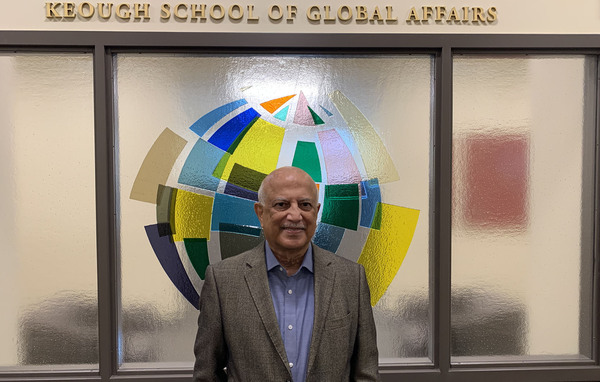Bangladesh has emerged as a shining example of a nation making a significant difference in addressing food security challenges. Despite its population density and limited resources, the South Asian country has made remarkable strides in improving food production, reducing poverty, and enhancing nutrition for its citizens.
Mushtaque R. Chowdhury, a Bangladeshi development worker, researcher, academic, and micro-philanthropist, has joined the Pulte Institute for Global Development and the Eck Institute for Global Health as a visiting scholar from September 2023 to February 2024. Chowdhury contributes to Notre Dame’s collective work to help all people access quality health services, safeguard them from public health risks, and protect them from impoverishment due to illness or environmental factors.
Below is an excerpt from "Learning from Bangladesh: Visiting Scholar Shares Insights from Public Health, Development Career."
Josh Stowe, Keough School Senior Content Specialist’s full profile on Chowdhury is available here.
A Global Development Case Study

During his time at Notre Dame, Chowdhury will draw on lessons from the turnaround in Bangladesh. Today, he said, the country’s public health prognosis is stronger than it was five decades ago. Cholera and diarrhea are no longer death sentences. Life expectancy has soared.
Chowdhury is working to share further insights as a visiting scholar on campus. At the Keough School’s Pulte Institute, he collaborates with researchers to tackle a range of development challenges, including expanding access to healthcare, addressing public health risks, and preventing people from falling into poverty because of illness or environmental factors.
Experimenting and Exporting Policy Solutions
For Chowdhury, tackling big challenges and sharing insights with others has been a natural progression. He grew up in a family of civil servants in Bangladesh and considered becoming one himself. When Bangladesh won its freedom, he started thinking more about the new country and its many problems and decided to focus on public health, development, and empowering women and the poor.
Working on these issues led him to join BRAC, a nongovernmental organization that Sir Fazle Hasan Abed founded. The organization, shaped by Abed’s focus on human dignity and realizing the potential of all people, has played a central role in Bangladesh’s turnaround.
Another lesson Chowdhury has taken from his work is the importance of experimenting and scaling up what works. Not long after Bangladesh gained independence, BRAC confronted a challenge in treating epidemics like cholera and diarrhea. Research had determined that oral rehydration therapy, delivered in a simple saline solution, would provide life-saving electrolytes. However, the government couldn’t afford to buy and distribute enough doses to hospitals and clinics. In the 1970s, BRAC devised a workaround. After experimenting and considering what most households had handy, it found that adding a pinch of salt and a fistful of molasses or sugar to a half-liter of water worked just as well.
Importantly, the organization also realized that it would never materialize if no one heard about a potential health intervention. Starting around 1980, BRAC sent workers across the country to spread the word.
“We decided that we should let people know about it, and BRAC trained thousands of health workers, who went from house to house and taught more than twelve million mothers how to prepare effective solutions,” Chowdhury recalled. “Because of this approach, Bangladesh has the world’s highest rate of oral rehydration therapy to treat diarrheal illnesses.”
As BRAC grew and Chowdhury met health and development experts in his travels and professional posts, he quickly realized the power of documentation and communication. Both were needed to ensure the work done by BRAC and other nongovernmental organizations made it beyond the small villages where they began.